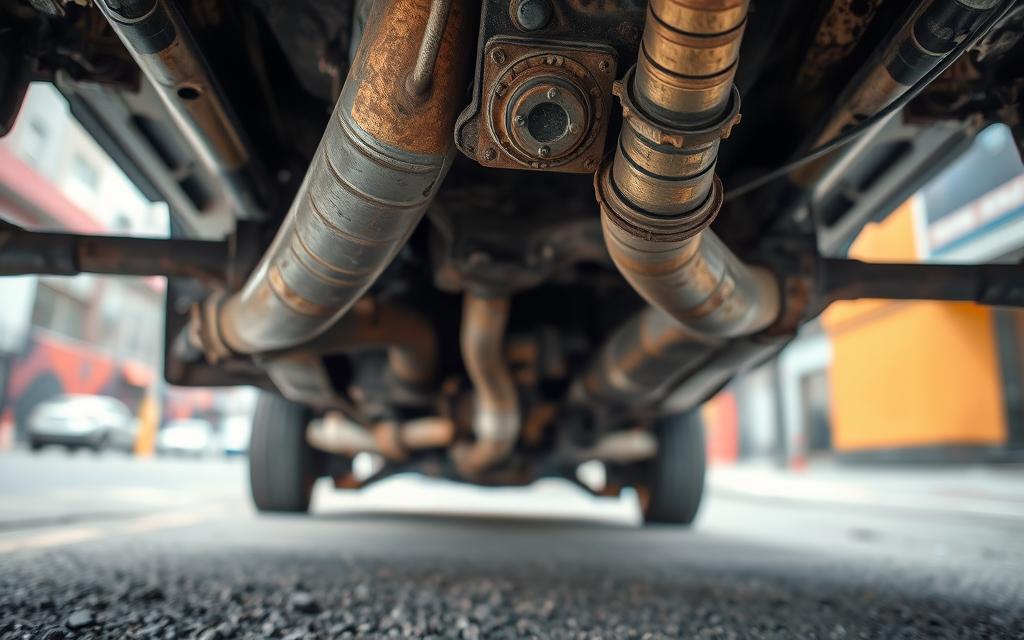Car owners often worry about rattling noises while driving. These sounds can come from many parts, like the engine, transmission, suspension, or exhaust. Finding out where the noise is coming from is key to fixing it right away. If you ignore these sounds, they could turn into bigger problems that are costly and might even make your car unsafe.
Rattling noises can mean many things, from small wear and tear to big problems. It’s important to fix these sounds quickly to keep your car running well for a long time. In this article, we’ll look at why cars make rattling noises, why you should act fast, and how to find and fix the issue.
Key Takeaways
- Rattling noises in a car can signify various issues, from minor to serious problems
- Identifying the source of the rattling is crucial for proper diagnosis and timely repairs
- Ignoring car rattling noises can lead to more expensive repairs and compromise vehicle safety
- Addressing rattling sounds promptly is essential to maintain the vehicle’s performance and longevity
- Regular vehicle inspections and scheduled maintenance can help prevent and identify rattling issues early on
Understanding the Rattling Noise in Cars
When you hear rattling noises in your car, it’s time to check your vehicle diagnostics. These sounds can come from loose exhaust parts, bad suspension, or worn engine parts. Knowing what causes these noises helps with car maintenance and keeps you safe on the road.
Common Causes of Rattling Sounds
Rattling noises can be caused by several things, including:
- Low transmission fluid level
- Bad torque converter
- Failure of the motor mount
- Loose or broken heat shields
- Bent or loose V-belt pulleys
- Worn wheel bearings
- Unsteady tire wear
- Damaged suspension components
- Loose or worn exhaust systems
- Damaged brake rotors
- Low engine oil levels
- Broken belts
- Damaged engine pistons
- Bad alternator
- Damaged catalytic converter
- Worn timing belt
- Broken AC compressor
Importance of Immediate Attention
Don’t ignore the rattling noises in your car. These sounds often mean there’s a bigger problem that needs fixing. If you don’t take care of it, it could get worse and cost a lot more to fix. It’s important to find and fix the source of the rattling to keep your car running well.
| Rattling Noise Source | Potential Consequences |
|---|---|
| Low transmission fluid level | Accelerated wear and tear on transmission components |
| Bad torque converter | Decreased fuel efficiency and power delivery |
| Failure of the motor mount | Increased engine vibration and potential engine misalignment |
| Loose or broken heat shields | Risk of fire and exhaust system damage |
| Worn wheel bearings | Decreased handling, potential wheel failure |
Engine-Related Noises: What to Look For
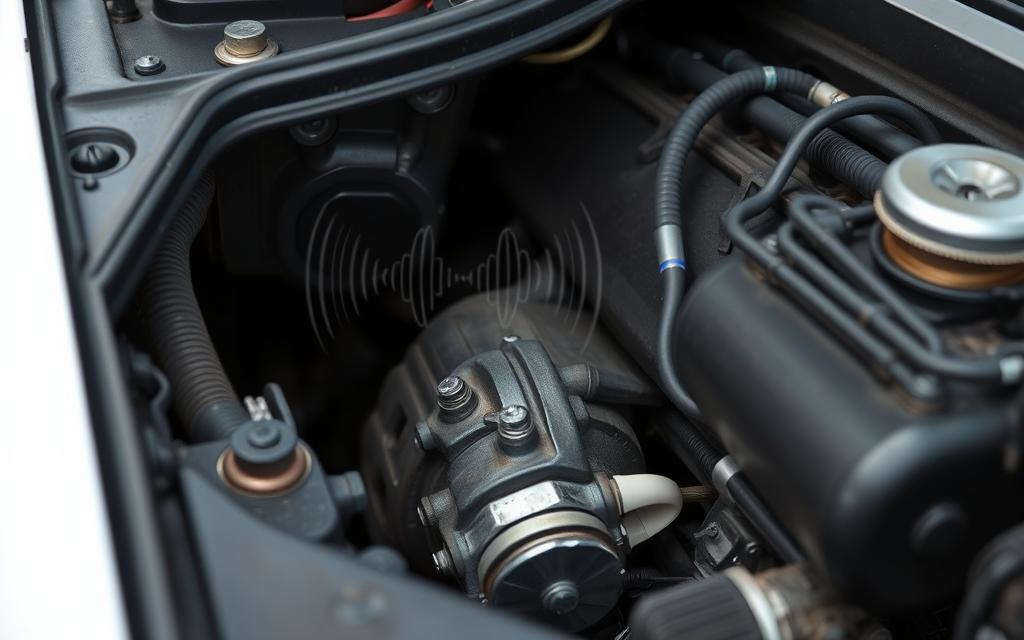
The engine is the heart of your car. Any unusual noises from it should be taken seriously. Rattling sounds from the engine area can mean many mechanical issues. It’s important to find out where these noises come from to keep your car running well.
Loose Engine Mounts
Loose or worn-out engine mounts can cause rattling noises. These mounts keep the engine in place. If they’re not working right, the engine can move and make a rattling sound. Replacing the engine mounts can fix this problem and stop the noise.
Worn-Out Belts or Chains
Worn belts and chains can also cause rattling noises. The serpentine belt, which powers engine accessories, can wear out and slip. This can make a rattling sound. A worn-out timing chain can also make a similar noise, showing it needs to be replaced.
Checking and maintaining your engine regularly can prevent these problems. This includes keeping an eye on oil levels and the condition of belts and chains. Fixing any mechanical issues quickly can keep your car running well and last longer.
Transmission Issues That Cause Rattling
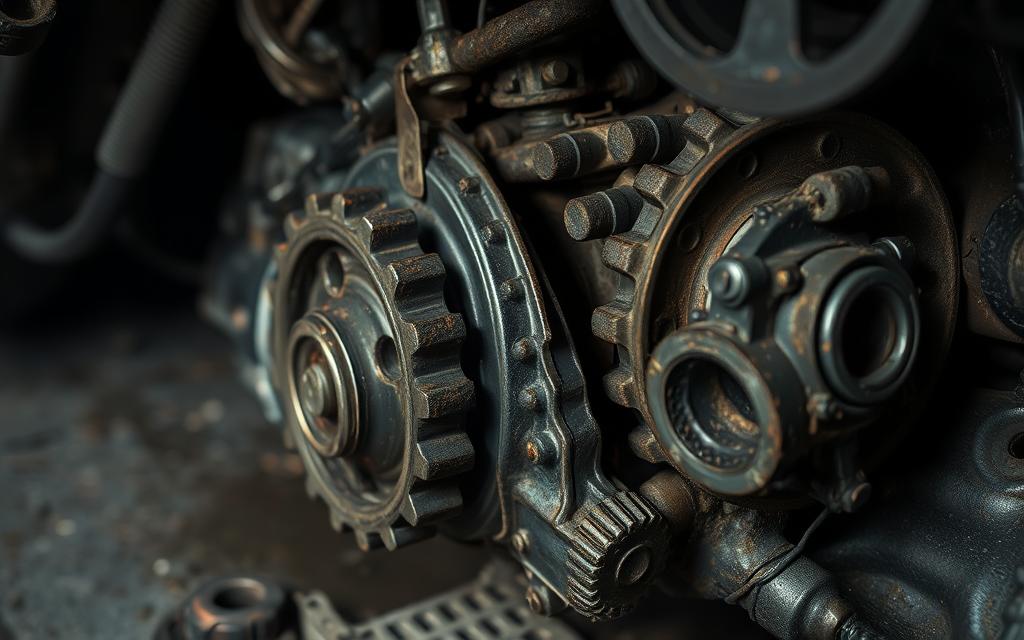
Transmission problems often lead to rattling noises in cars. Worn or damaged transmission mounts can cause movement and rattling sounds. Also, internal failures like worn gears or bearings can produce rattling sounds.
Transmission Mount Problems
The transmission mount keeps the transmission stable, reducing vibrations. Over time, these mounts can wear out, causing rattling noises. It’s important to fix these issues quickly to avoid more serious problems.
Internal Transmission Failures
Worn-out gears or bearings can also cause rattling. When these parts fail, they make grinding noises. Ignoring these problems can lead to a complete transmission failure, which is very expensive.
If your car’s transmission is rattling, get it checked by a mechanic. Quick action can prevent major damage and keep your car running well. Don’t delay fixing transmission issues to avoid costly repairs.
| Statistic | Value |
|---|---|
| Occurrence rate of rattling noise during gear shifting from 1st to 2nd and 2nd to 3rd gear | 100% |
| Occurrence rate of rattling noise during other gear shifts | 0% |
| Mechanic’s recommendation against fixing the rattling issue | Yes, due to the issue resurfacing after a certain amount of time |
| Estimated cost for fixing the issue provided by the mechanic | “a few hundred bucks” |
| Confirmation that the rattling noise does not affect gear changes or performance | Yes |
| Specific car models affected by rattling due to higher torque | BMW 320i, 330ci |
| Personal stance on fixing the rattling issue due to irrelevance | Not willing to spend a few hundred bucks |
Suspension Problems Leading to Rattling Sounds
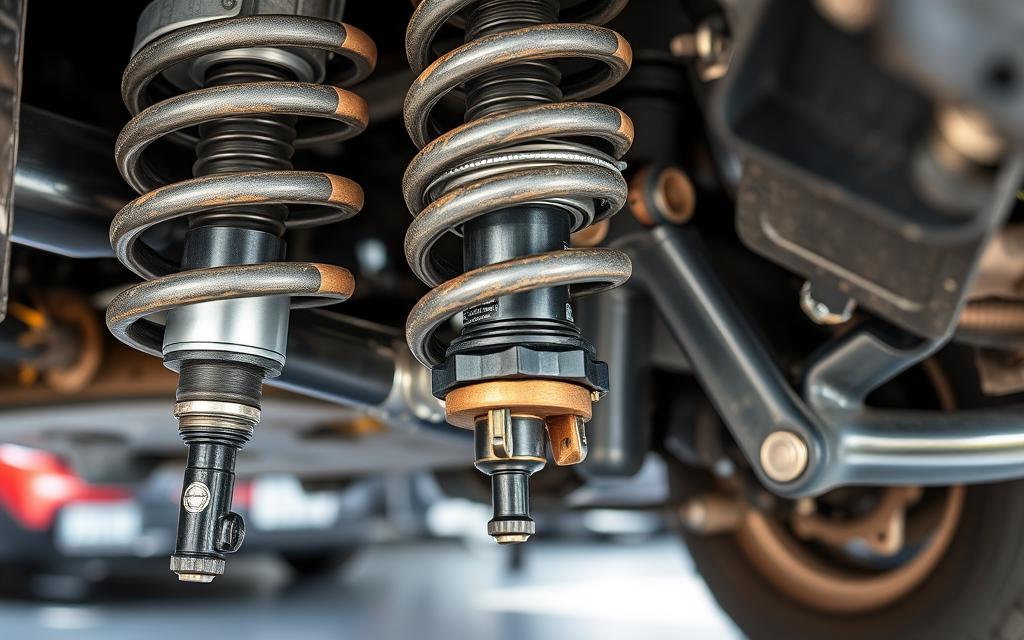
The suspension system is often to blame for rattling noises in vehicles. Parts like ball joints, tie rods, struts, or control arms can loosen over time. This leads to annoying sounds while driving.
Ignoring these problems can make driving unpleasant. It can also affect your car’s handling and safety.
Worn Bushings or Shock Absorbers
Worn bushings and shock absorbers are common causes of rattling. They help ensure a smooth ride but wear out with age and mileage. When they fail, the suspension can’t handle bumps well, causing rattling.
Loose or Broken Components
Loose or broken parts in the suspension also cause rattling. This includes control arms, tie rods, ball joints, sway bar links, and springs. When these parts fail, the suspension loses stability, leading to rattling.
Regular checks and repairs of suspension parts are key. Fixing these issues quickly improves ride quality and stability. It also keeps your car safe and reliable on the road.
| Suspension Component | Percentage of Reported Rattling Noises |
|---|---|
| Control Arms | 35% |
| Ball Joints | 25% |
| Shocks/Struts | 20% |
| Sway Bar Links | 15% |
With over 40 years of experience, we know how critical it is to fix suspension issues quickly. Rattling noises can harm your car’s performance and safety. Regular maintenance and attention to unusual sounds help keep your car smooth and enjoyable to drive.
Exhaust System Rattles: A Common Issue
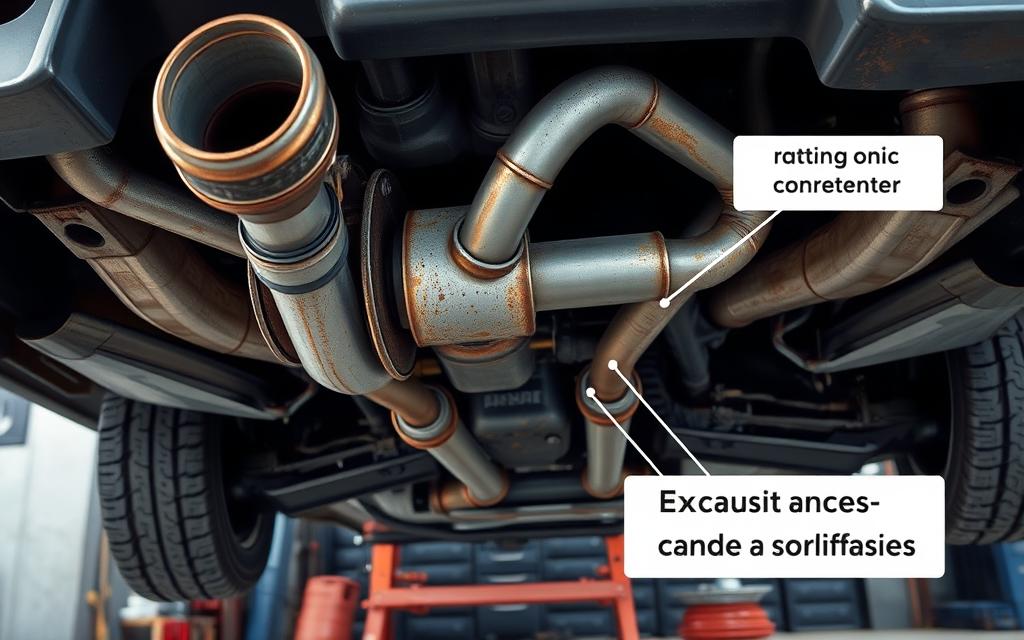
Rattling noises from the exhaust system are common among car owners. These sounds usually come from loose heat shields or broken exhaust hangers. Corrosion or wear can make exhaust parts vibrate, causing the rattling sound.
Loose Heat Shields
Heat shields protect the undercarriage and nearby parts from exhaust heat. Over time, they can loosen and rattle against the exhaust pipe. This annoying noise can also cause more damage if not fixed.
Broken Exhaust Hangers
Exhaust hangers keep the exhaust system in place and prevent sagging. When they wear out or break, the system moves and rattles. Fixing these hangers is key to a quiet and secure exhaust system.
A failing catalytic converter can also cause rattling sounds as it breaks down. Ignoring these issues can harm engine performance, increase emissions, and pose safety risks. It’s important to check and fix exhaust parts to keep your car efficient, meet emissions standards, and ensure a smooth ride.
“The exhaust system is a critical component of a vehicle, and any rattling or unusual noises should be addressed promptly to avoid further damage and ensure your car is running at its best.”
Brake System Noises and Rattling
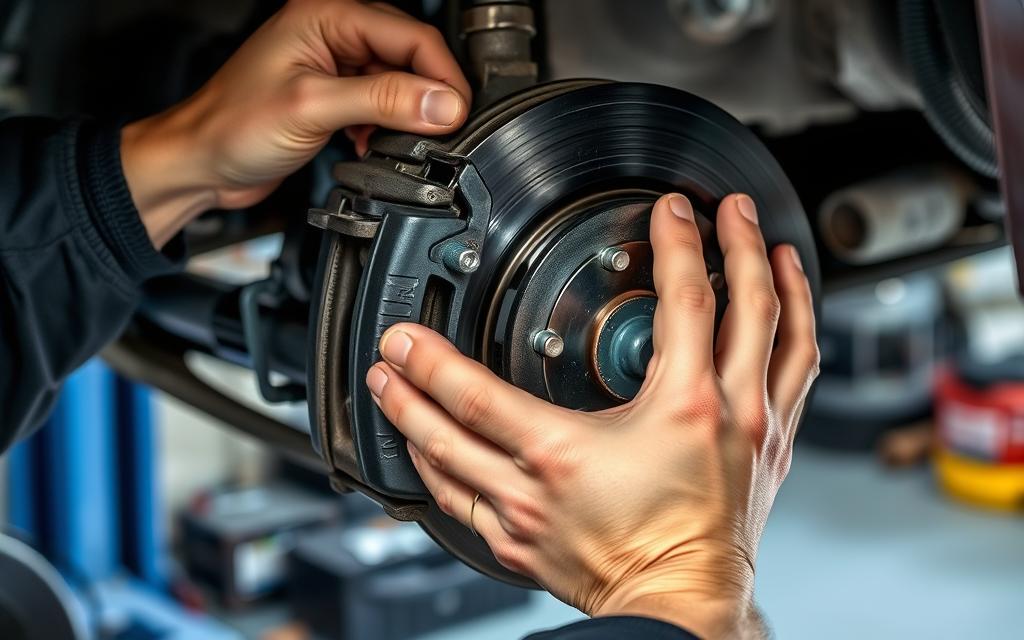
Your vehicle’s safety depends a lot on its brake system. If you hear rattling or unusual noises from the brakes, it’s a sign of trouble. These sounds mean you need to fix the problem fast.
Worn Brake Pads or Rotors
Worn-out brake pads or rotors can cause rattling. As pads wear down, they vibrate against the rotors, making squealing sounds. Uneven rotors also lead to noises. Replacing these parts is key to keeping your brakes working right.
Loose Calipers
Loose or sticking calipers make rattling noises, mainly when driving. If calipers don’t fit right or have problems, brake pads move strangely. This makes a rattling sound. Fixing loose or broken calipers is vital for safe braking.
Squealing or grinding sounds from the brakes mean trouble, like worn pads or stuck calipers. Fixing these issues quickly is important for safety and to avoid brake damage.
Regular brake checks during oil changes can catch problems early. Paying attention to brake noises is crucial for brake maintenance, vehicle safety, and car repair.
“Rattling noises in the brake system should never be ignored, as they can signify serious problems that require immediate attention for the safety of you and your passengers.”
Fixing brake system noises and rattling quickly keeps your vehicle safe. It also makes your brake maintenance better and extends your car repair life.
Rattling from the Wheels: Causes and Solutions
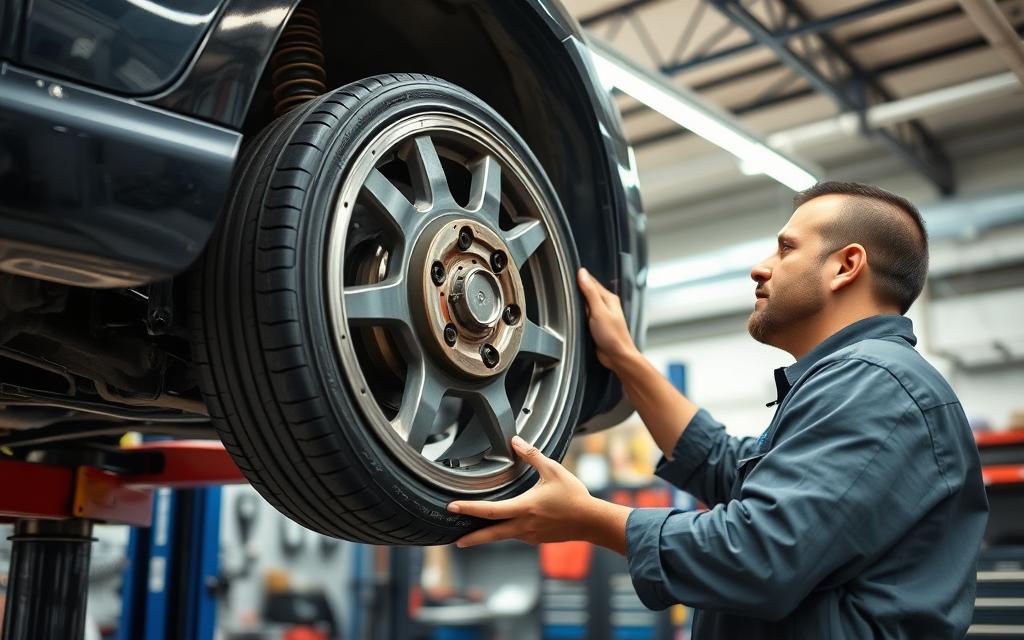
Many car owners hear strange rattling sounds from their wheels. These sounds can be scary and annoying. They might come from worn-out wheel bearings or loose lug nuts, which need quick fixes to keep your car safe and running well.
Wheel Bearing Wear
Worn-out wheel bearings often cause these rattling sounds. Over time, they can start to move more than they should. This movement makes a rattling or growling noise, usually when you’re driving fast or turning.
Fixing worn wheel bearings is key. They help keep your wheels aligned and prevent uneven tire wear.
Loose Lug Nuts
Loose lug nuts can also cause rattling. When they’re not tight, the wheel can wobble and make a rattling sound. It’s very important to fix this right away because loose lug nuts can make the wheel unsafe.
Checking and tightening lug nuts regularly is a must. It’s part of keeping your car in good shape.
Keeping your wheels in check is vital for your car’s safety. Regular checks, tire rotations, and fixing any tire problems can stop these rattling noises. By being proactive, you can drive safely and smoothly.
The Role of Loose Trim and Panels
Rattling noises in vehicles often come from loose trim and panels. These can be on the outside or inside of the car. Over time, vibrations and wear can make these parts come loose, causing a rattle while driving.
Checking for Loose Exterior Trim
Exterior trim pieces like side moldings and bumper covers can rattle if they’re loose. Regular checks can spot any loose parts. Tightening or replacing screws can fix these rattles.
Interior Panel Issues
Inside, rattles can come from loose panels or worn-out seals. Even items in the glove box or trunk can cause noise. A simple loose screw on the dashboard or a worn door panel can rattle. Checking all interior parts for fit and tightening loose ones can quiet these noises.
Keeping up with regular maintenance and inspections is key. It helps find and fix rattling noises. By fixing these small issues, drivers can have a quieter, more comfortable ride.
Diagnosing the Rattling Noise Yourself
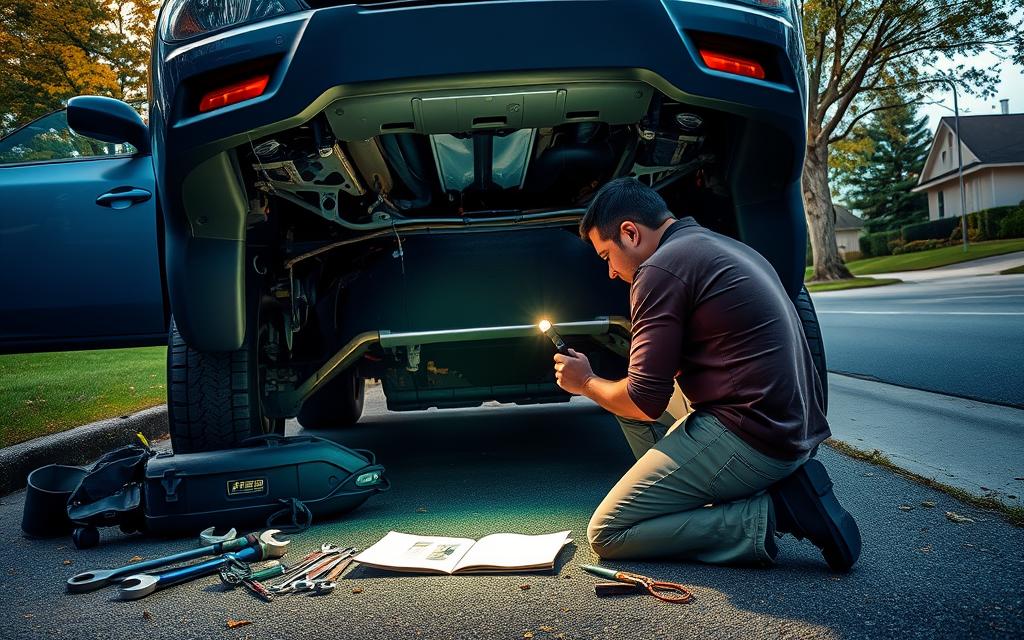
Identifying a rattling noise in your car can start with DIY car diagnostics. By listening and visually inspecting your vehicle, you can often find the noise’s source. This helps you decide if you need a professional to look at it.
Listening Techniques for Accurate Diagnosis
Listen carefully to when and where the rattling noise happens. Does it occur during acceleration, at certain speeds, or over bumps? Also, note if the vibration is felt in the seat, steering wheel, or all over. These details can help you guess the cause.
Visual Inspection Tips
- Check the engine area for loose or worn parts like engine mounts, belts, or chains.
- Look at the suspension system for worn bushings, shock absorbers, or loose parts.
- Find any loose or damaged exhaust system parts, including heat shields and hangers.
- Check the brakes for worn pads or rotors that might cause a rattling noise.
- Inspect the wheels and tires for signs of bearing wear or loose lug nuts.
- Look inside for loose trim pieces, panels, or objects that could be making the noise.
Some issues are easy to spot with DIY diagnostics, but complex problems need a mechanic’s help. If you’re unsure, it’s best to get expert advice. This ensures your vehicle stays safe and runs well.
| Common Rattling Noise Causes | Average Repair Cost |
|---|---|
| Misaligned exhaust system | £121.36 |
| Suspension issues | £135.27 |
| Low engine oil | £116.30 |
| Faulty serpentine/drive belt | £123.28 |
| Damaged catalytic converter | £433.80 |
When to Consult a Professional Mechanic
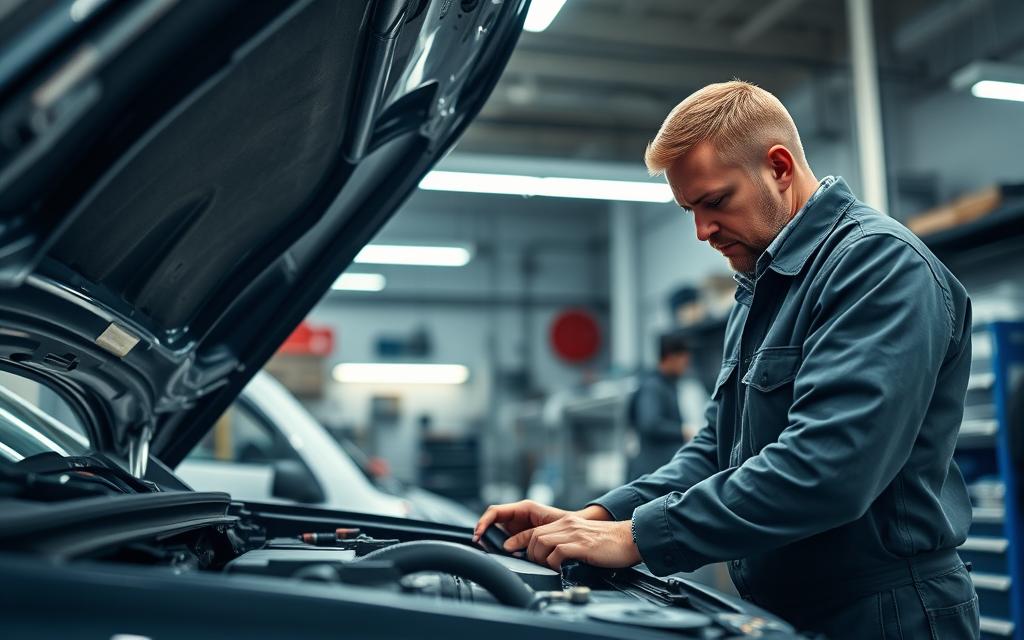
Some rattling noises in a car can be fixed with DIY maintenance. But, when the rattling is persistent or complex, it’s best to see a professional mechanic. They have the skills to find and fix the problem.
Signs That Require Immediate Attention
If your car rattles and also has other problems like poor engine performance, hard steering, or weird vibrations, get it checked by a pro. These signs might mean something serious is wrong. It’s important to fix it fast to avoid more damage and keep you safe on the road.
Cost Considerations for Repairs
The price to fix a rattling noise can change a lot, based on what’s wrong. A simple fix might cost little, but a big repair like a new catalytic converter can be pricey. A mechanic can tell you exactly what’s needed and how much it will cost. This can save you money by fixing the problem right the first time.
Thinking about fixing it yourself or getting a mechanic’s help? It’s smart to think about the risks and costs. A skilled mechanic can give you peace of mind and make sure the job is done right. This helps your car last longer and run better.
| Repair Type | Estimated Cost |
|---|---|
| Loose Exhaust System | $100 – $300 |
| Catalytic Converter Replacement | $800 – $1,500 |
| Wheel Bearing Repair | $200 – $400 |
| Suspension Component Replacement | $300 – $800 |
When your car makes a persistent or complex rattling noise, it’s best to see a professional car repair specialist. They have the automotive expertise to find and fix the problem. They can do it in a way that’s good for your wallet and keeps your car running well for a long time.
Impact of Rattling Noises on Vehicle Performance
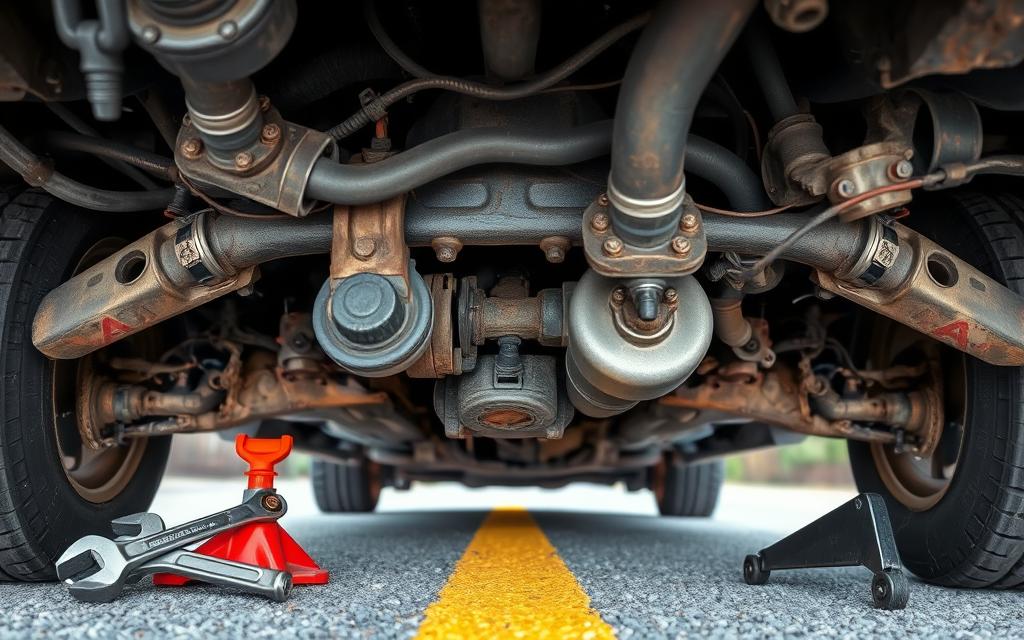
Ignoring rattling noises in your car can harm its performance and safety. Problems can get worse over time. This might lead to parts failing, less fuel efficiency, or poor handling.
Safety Risks of Ignoring the Rattle
Safety is key when dealing with rattling noises. Ignoring them can cause brake failure, loss of steering, or sudden breakdowns. Loose or damaged parts like exhaust systems and engine mounts are dangerous if not fixed.
Potential Long-term Damage
Ignoring rattling noises can lead to bigger problems later. Not fixing the cause can mean expensive repairs. Issues like worn-out bearings or corroded exhausts can get worse fast, costing a lot to fix.
Listening to unusual noises and fixing them quickly keeps your car safe and running well. Regular maintenance is vital to avoid big problems and ensure your safety.
Maintenance Tips to Prevent Rattling Noises
Keeping your car in top shape is key to avoiding those pesky rattling noises. Regular preventive maintenance and attentive car care tips are essential. They help keep your vehicle running well for a long time.
Regular Vehicle Inspections
Routine inspections are a must to catch problems early. Check the suspension, exhaust system, engine mounts, and brake parts for wear or looseness. This helps you fix issues before they cause annoying rattles.
Importance of Scheduled Maintenance
- Follow the manufacturer’s maintenance schedule to keep your car in good shape.
- Regular oil changes, belt replacements, and fluid checks can prevent many issues. This includes annoying rattling noises.
- Staying on top of routine maintenance prevents irritating sounds. It also extends your vehicle’s longevity, improves performance, and keeps it safe.
Investing in proactive preventive maintenance and following practical car care tips is crucial. It preserves your car’s smooth operation and prevents unwanted rattling noises. By doing routine inspections and following the manufacturer’s schedule, you ensure your vehicle runs at its best. This maximizes its longevity.
How Weather Conditions Affect Rattling Noises
The weather can greatly affect rattling noises in your car. It’s important to know how seasons and temperature changes impact your car’s parts. This knowledge is key for good seasonal car care and automotive maintenance.
Impact of Cold Weather
When it gets cold, car materials contract, making rattles worse or new ones appear. The weather effects on vehicles make engine oil thicker, causing more friction and noise. Cold also changes the viscosity of fluids like transmission fluid, adding to the rattling sounds.
How Heat Can Affect Components
On the other hand, hot weather makes materials expand, leading to loose parts or bad fits. This can cause rattling from parts like rubber bushings, seals, and the exhaust system. The weather effects on vehicles put stress on parts, speeding up wear and tear and rattling noises.
Knowing your car’s seasonal car care needs and fixing issues early can reduce weather-related rattling. Regular checks and maintenance keep your car running smoothly and quietly all year.
The Importance of Quality Parts in Reducing Noise
Quality parts are key to fixing rattling noises in your car. Using automotive parts quality and OEM components can greatly help. These parts are made to last and fit perfectly, reducing rattling sounds.
Choosing Reliable Brands
Choosing automotive parts quality from trusted brands is vital. These brands focus on durability and fit, reducing wear and rattling. Reliable vehicle repair materials ensure your car’s parts work well together, cutting down on noise.
Benefits of OEM vs. Aftermarket Parts
The choice between OEM components and aftermarket parts matters for rattling issues. OEM parts fit your car perfectly and work best. Aftermarket parts might save money but can cause rattling problems later.
It’s important to find a balance between cost and quality for a quiet car. By choosing automotive parts quality and OEM components, you can avoid rattling and enjoy a smoother ride.
“Thousands of parts in a car can potentially cause rattling when they are not securely assembled, highlighting an industrywide problem.”
Case Studies: Common Rattling Noise Scenarios
Experienced mechanics often find out about real-world problems that cause rattling noises in cars. These stories show the different issues and why fixing them quickly is key to keeping a car running well.
Experiences from Mechanics
A mechanic once fixed a car with a rattling sound. They found a loose heat shield was the cause. But, the loose shield also damaged the exhaust system, needing bigger repairs.
Another mechanic talked about a car with a rattling noise from a worn-out timing belt. The owner didn’t think much of it, but the mechanic knew it was serious. Not fixing the timing belt damaged the engine, making repairs much harder and more expensive.
Impacts on Vehicle Longevity
- Ignoring rattling noises can lead to more problems and shorten a car’s life.
- Fixing the noise quickly can stop bigger and more costly repairs later.
- Regular maintenance, as these stories show, is key to keeping a car in good shape.
These mechanics’ stories stress the need to find and fix rattling noises fast. By learning from these experiences, car owners can make better choices for their vehicle’s health and life span.
Final Thoughts on Rattling Noises in Your Car
It’s important to fix rattling noises in your car fast. This keeps you safe, your car running well, and lasts longer. Regular checks, knowing where rattles come from, and when to call a pro are key. Quick action stops small problems from becoming big, expensive ones.
Summary of Key Takeaways
Knowing your car’s sounds and acting fast makes driving safer and more reliable. Regular car care, like oil changes and suspension checks, finds and fixes rattles early. This keeps your car in good shape and its value high.
Encouraging Prompt Action for Safety
A well-kept car is safer, runs better, and keeps its value. Not fixing rattling sounds can be risky and cause more damage. Fixing these issues fast, by yourself or with a pro, keeps your car running great and you safe on the road.
FAQ
What are the common causes of rattling noises in cars?
Why is it important to address rattling noises promptly?
What engine-related issues can cause rattling?
How can transmission-related issues cause rattling?
What suspension problems can lead to rattling noises?
What exhaust system problems can create rattling sounds?
How can brake system issues contribute to rattling noises?
What wheel-related problems can lead to rattling?
How can loose trim and panels cause rattling in a vehicle?
How can I diagnose the source of the rattling noise myself?
When should I consult a professional mechanic for rattling noise issues?
How can ignoring rattling noises impact vehicle performance and safety?
What steps can I take to prevent rattling noises in my vehicle?

Jack Thompson is a writer and seasoned auto mechanic with over 15 years of experience in the automotive industry. Known for his expertise in vehicle mechanics, Jack has a deep understanding of car and truck systems. His skills, honed through years of hands-on experience, have made him a trusted name in the field. Jack is committed to providing valuable insights into car maintenance and repair, helping vehicle owners keep their vehicles in top condition.

